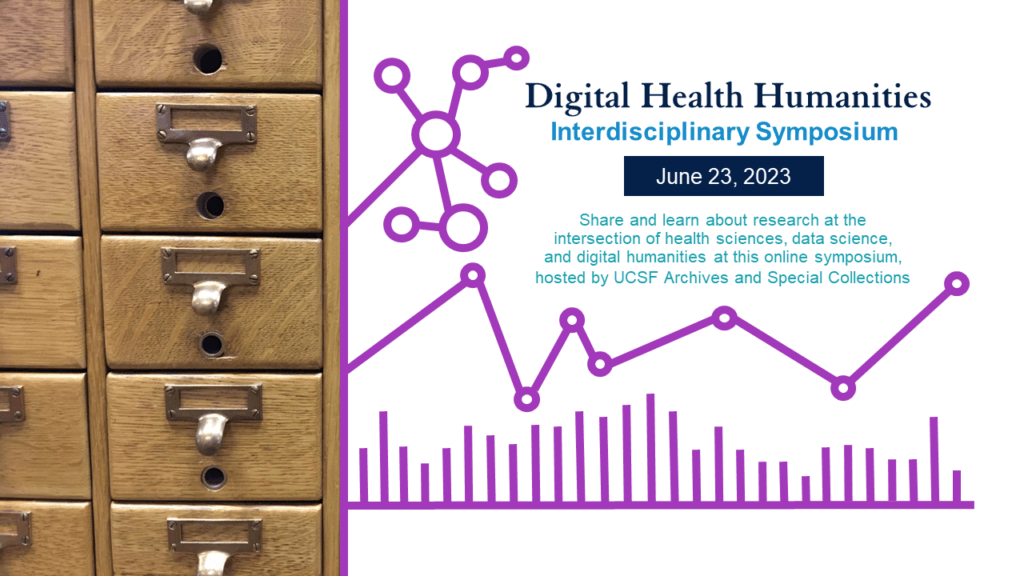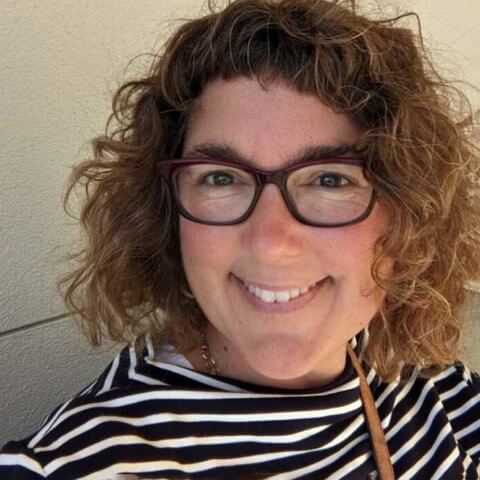The University of California, San Francisco (UCSF) Archives and Special Collections is hosting an online Digital Health Humanities 2023 Interdisciplinary Symposium as part of the Digital Health Humanities (DHH) pilot program on Friday, June 23, 2023, from 9 a.m. to 2:30 p.m. PT. This symposium is an opportunity for researchers from the UCSF community and beyond to learn and share research at the intersection of health sciences, data science, and digital humanities.
Symposium schedule
Welcome and Lightening Talk Showcase | 9 – 10:45 a.m. PT
Presenters:
- UCSF-affiliated faculty, students, and researchers
Following an overview of the UCSF Digital Health Humanities pilot program, presenters from the UCSF community will share brief lightning talks. Talk themes include research processes, exploration/experimentation, early findings, challenges, or new research questions under consideration. Additionally, there will be time reserved for Q&A. This session is intended to spark conversation and surface potential collaboration opportunities or further insights relating to digital health humanities.
Historical Patient Health Records as Data: Challenges and Opportunities | 11 a.m. – 12:30 p.m. PT
Presenters:
- Polina Ilieva, associate university librarian for collections and archivist, UCSF Library
- Aimee Medeiros, associate professor, director of the UCSF History of Health Sciences Program
- Kim Pham, research technology officer, Max Planck Institute
Historical patient records can provide valuable insights into the social, behavioral, economic, and institutional contexts of health and disease. With advances in computational analysis, there is potential for conducting new research with these records as data. This leads to better understandings, for example, socio-economic characteristics within and across communities and how these intersect with health conditions and healthcare. Libraries and archives have begun digitizing and preparing data from collections of historical patient records to address research interests, but not without careful consideration of attendant ethical issues. Panelists representing archival, technological, and historical perspectives will share examples from their own work and respective institutions. This session will be followed by a facilitated discussion on the challenges and opportunities that remain in providing access to and conducting research with historical patient records.
Analyzing Medical Literature: Tracking Topics Over Time | 1 – 2:30 p.m. PT
Presenters:
- Claudia von Vacano, founding executive director, senior research associate, primary investigator, UC Berkeley D-Lab
- Pratik Sachdeva, data scientist, senior consultant, and senior instructor, UC Berkeley D-Lab
- Moustafa Abdalla, research associate, Harvard Medical School
- Melissa Grafe, John R. Bumstead Librarian for Medical History, head of the Medical Historical Library at Yale University and board member for the Medical Heritage Library
Archives of published medical literature provide researchers with insights into the evolution of medical care and related research. These archives also reveal developments in professional community norms, ethics, and values. Panelists representing the fields of digital social science, technological sciences, library sciences, and historical perspectives will share examples from their own work and respective institutions. This session will be followed by a facilitated discussion on contextualizing and analyzing medical literature to surface trends and narratives about health care provision, systemic social inequities, and more.
Questions?
Please contact DHH Program Coordinator, Kathryn Stine at kathryn.stine@ucsf.edu to participate in the Symposium or for questions about digital health humanities at UCSF. The UCSF DHH pilot is funded by the Academic Senate Chancellor’s Fund via the Committee on Library and Scholarly Communication.

